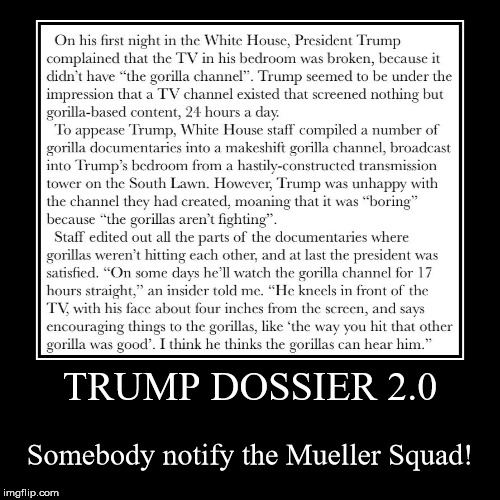
Many allegations in the dossier have been dismissed by authorities or remain unverified.

The Mueller Report contained passing references to some of the dossier's allegations but little mention of its more sensational claims. intelligence community took the allegations seriously, and the Federal Bureau of Investigation (FBI) investigated every line of the dossier and identified and spoke with at least two of Steele's sources. The United States intelligence community and most experts have treated the dossier with caution due to its unverified allegations, which Trump denounced as fake news. While compiling the dossier, Steele passed his findings to both British and American intelligence services. After the election, DNC officials denied knowing their attorney had contracted with Fusion GPS, and Steele asserted he was not aware the Clinton campaign was the recipient of his research until months after he contracted with Fusion GPS. In June 2016, Fusion GPS subcontracted Steele's firm, Orbis Business Intelligence, to compile the dossier.

However, a judge defended BuzzFeed 's action as the public has a right to know so it can "exercise effective oversight of the government". Their decision to publish the reports without verifying the allegations was criticized by journalists. It was published by BuzzFeed News on January 10, 2017, without Steele's permission. It also alleges that Russia sought to damage Hillary Clinton's candidacy. The dossier's 17 reports allege that Trump campaign members and Russian operatives had conspired to cooperate in Russia's election interference to benefit Trump. Steele, a former head of the Russia Desk for British intelligence (MI6), was writing the report for the private investigative firm Fusion GPS, who were paid by Hillary Clinton's campaign and the Democratic National Committee (DNC). The dossier is an unfinished 35-page compilation of raw intelligence based on information from initially anonymous sources known to the author, counterintelligence specialist Christopher Steele. Some have been publicly confirmed, others are plausible but not specifically confirmed, and some are dubious in retrospect but not strictly disproven. While Steele's documents played a significant role in initially highlighting the general friendliness between Trump and the Putin administration, the veracity of specific allegations is highly variable.

Several key allegations made in June 2016 were later corroborated by the January 2017 report by the Office of the Director of National Intelligence, namely that Vladimir Putin favored Trump over Hillary Clinton that he personally ordered an "influence campaign" to harm Clinton's campaign and to "undermine public faith in the US democratic process" that he ordered cyberattacks on both parties and that many Trump campaign officials and associates had numerous secretive contacts with Russian agents.

The Steele dossier, also known as the Trump–Russia dossier, is a controversial political opposition research report written from June to December 2016, containing allegations of misconduct, conspiracy, and cooperation between Donald Trump's presidential campaign and the government of Russia prior to and during the 2016 election campaign.


 0 kommentar(er)
0 kommentar(er)
